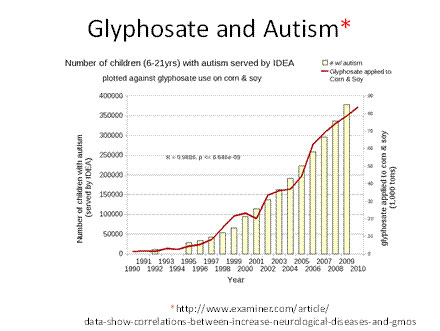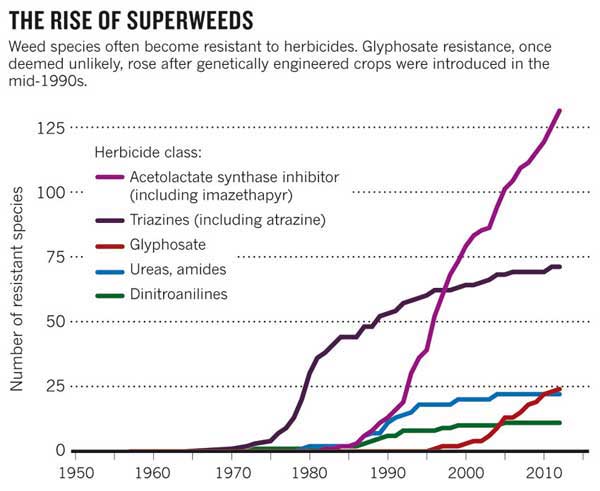valley ranch
Garden Master
- Joined
- Dec 22, 2014
- Messages
- 5,742
- Reaction score
- 5,734
- Points
- 367
Research Reveals Previously Unknown Pathway by which Glyphosate Wrecks Health
May 14, 2013 | 318,630 views
Visit the Mercola Video Library
By Dr. Mercola
The more we learn about genetically engineered (GE) foods, the clearer the dangers become. I’ve warned you of the potential dangers of GE foods for many years now, as I was convinced that the artificial combining of plants with genes from wildly different kingdoms is bound to cause problems.
As the years roll on, such suspicions are becoming increasingly validated. In recent weeks, we’ve not only learned that GE corn is in no way comparable to natural corn in terms of nutrition, we’re also discovering the ramifications of dousing our crops with large amounts of glyphosate — the active ingredient in Monsanto’s broad-spectrum herbicide Roundup.
GE crops are far more contaminated with glyphosate than conventional crops, courtesy of the fact that they’re engineered to withstand extremely high levels of Roundup without perishing along with the weed.
A new peer-reviewed report authored by Anthony Samsel, a retired science consultant, and a long time contributor to the Mercola.com Vital Votes Forum and Dr. Stephanie Seneff, a research scientist at the Massachusetts Institute of Technology (MIT) has fortunately received quite a bit of mainstream media attention.
Their findings, along with the development of another breed of “gene silencing” crops, makes the need for labeling all the more urgent, and the advice to buy certified organic all the more valid.
How Glyphosate Worsens Modern Diseases
While Monsanto insists that Roundup is safe and “minimally toxic” to humans, Samsel and Seneff's research tells a different story altogether. Their report, published in the journal Entropy,1 argues that glyphosate residues, found in most commonly consumed foods in the Western diet courtesy of sugar, corn, soy and wheat, “enhance the damaging effects of other food-borne chemical residues and toxins in the environment to disrupt normal body functions and induce disease.” According to the authors:
"Negative impact on the body is insidious and manifests slowly over time as inflammation damages cellular systems throughout the body.”
The main finding of the report is that glyphosate inhibits cytochrome P450 (CYP) enzymes, a large and diverse group of enzymes that catalyze the oxidation of organic substances. This, the authors state, is “an overlooked component of its toxicity to mammals.”
One of the functions of CYP enzymes is to detoxify xenobiotics—chemical compounds found in a living organism that are not normally produced or consumed by the organism in question. By limiting the ability of these enzymes to detoxify foreign chemical compounds, glyphosate enhances the damaging effects of those chemicals and environmental toxins you may be exposed to.
Dr. Stephanie Seneff has been conducting research at MIT for over three decades. She also has an undergraduate degree in biology from MIT and a minor in food and nutrition, and I have previously interviewed her about her groundbreaking insights into the critical importance of sulfur in human health. Not surprisingly, this latest research also touches on sulfur, and how it is affected by glyphosate from food.
“Here, we show how interference with CYP enzymes acts synergistically with disruption of the biosynthesis of aromatic amino acids by gut bacteria, as well as impairment in serum sulfate transport,” the authors write.
“Consequences are most of the diseases and conditions associated with a Western diet, which include gastrointestinal disorders, obesity, diabetes, heart disease, depression, autism, infertility, cancer and Alzheimer’s disease.
We explain the documented effects of glyphosate and its ability to induce disease, and we show that glyphosate is the 'textbook example' of exogenous semiotic entropy: the disruption of homeostasis by environmental toxins.”
May 14, 2013 | 318,630 views
Visit the Mercola Video Library
By Dr. Mercola
The more we learn about genetically engineered (GE) foods, the clearer the dangers become. I’ve warned you of the potential dangers of GE foods for many years now, as I was convinced that the artificial combining of plants with genes from wildly different kingdoms is bound to cause problems.
As the years roll on, such suspicions are becoming increasingly validated. In recent weeks, we’ve not only learned that GE corn is in no way comparable to natural corn in terms of nutrition, we’re also discovering the ramifications of dousing our crops with large amounts of glyphosate — the active ingredient in Monsanto’s broad-spectrum herbicide Roundup.
GE crops are far more contaminated with glyphosate than conventional crops, courtesy of the fact that they’re engineered to withstand extremely high levels of Roundup without perishing along with the weed.
A new peer-reviewed report authored by Anthony Samsel, a retired science consultant, and a long time contributor to the Mercola.com Vital Votes Forum and Dr. Stephanie Seneff, a research scientist at the Massachusetts Institute of Technology (MIT) has fortunately received quite a bit of mainstream media attention.
Their findings, along with the development of another breed of “gene silencing” crops, makes the need for labeling all the more urgent, and the advice to buy certified organic all the more valid.
How Glyphosate Worsens Modern Diseases
While Monsanto insists that Roundup is safe and “minimally toxic” to humans, Samsel and Seneff's research tells a different story altogether. Their report, published in the journal Entropy,1 argues that glyphosate residues, found in most commonly consumed foods in the Western diet courtesy of sugar, corn, soy and wheat, “enhance the damaging effects of other food-borne chemical residues and toxins in the environment to disrupt normal body functions and induce disease.” According to the authors:
"Negative impact on the body is insidious and manifests slowly over time as inflammation damages cellular systems throughout the body.”
The main finding of the report is that glyphosate inhibits cytochrome P450 (CYP) enzymes, a large and diverse group of enzymes that catalyze the oxidation of organic substances. This, the authors state, is “an overlooked component of its toxicity to mammals.”
One of the functions of CYP enzymes is to detoxify xenobiotics—chemical compounds found in a living organism that are not normally produced or consumed by the organism in question. By limiting the ability of these enzymes to detoxify foreign chemical compounds, glyphosate enhances the damaging effects of those chemicals and environmental toxins you may be exposed to.
Dr. Stephanie Seneff has been conducting research at MIT for over three decades. She also has an undergraduate degree in biology from MIT and a minor in food and nutrition, and I have previously interviewed her about her groundbreaking insights into the critical importance of sulfur in human health. Not surprisingly, this latest research also touches on sulfur, and how it is affected by glyphosate from food.
“Here, we show how interference with CYP enzymes acts synergistically with disruption of the biosynthesis of aromatic amino acids by gut bacteria, as well as impairment in serum sulfate transport,” the authors write.
“Consequences are most of the diseases and conditions associated with a Western diet, which include gastrointestinal disorders, obesity, diabetes, heart disease, depression, autism, infertility, cancer and Alzheimer’s disease.
We explain the documented effects of glyphosate and its ability to induce disease, and we show that glyphosate is the 'textbook example' of exogenous semiotic entropy: the disruption of homeostasis by environmental toxins.”
Last edited:





